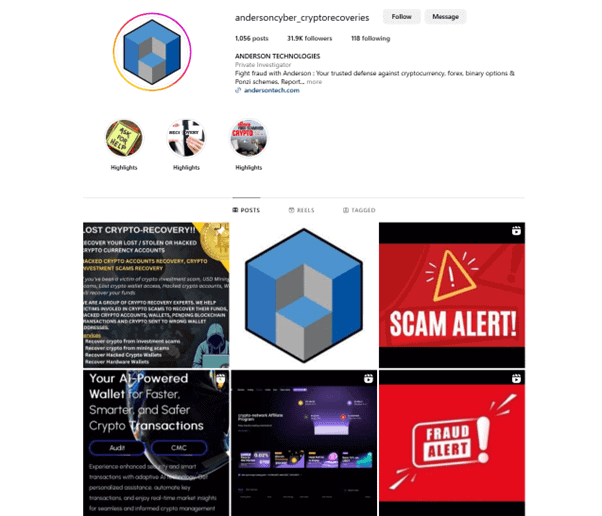
By Mark Anderson, Founding Principal
In the world of AI, digital-first, and social media, anyone can be impersonated or spoofed… even us. Learn about a new kind of cyber scam and how perpetrators are using legitimate businesses to try and validate their activities.
There are many types of cybercrime and cyberattacks happening every day online. But one prolific area, especially through social media channels, is scams relating to cryptocurrency. According to the FBI’s 2023 Internet Crime Report, cryptocurrency-related crime led to losses of approximately $3.94 billion in the US.
A new breed of scam has emerged, preying on those who have already fallen victim to crypto theft or fraud. These are known as “crypto recovery scams,” and they’re becoming increasingly prevalent on social media platforms like Instagram.
What are Crypto Recovery Scams?
Crypto recovery scams target individuals who have lost money through cryptocurrency theft or fraud. The scammers pose as “recovery experts” or “ethical hackers” who claim they can retrieve lost or stolen crypto assets for a fee and that they are there to help you and be ‘on your side against the bad guys’. However, these claims are false, and victims end up losing even more money as the scammers use the process of charging you their recovery fees to access key financial and/or personal information.
Another tactic that these scammers are using frequently is posing as a legitimate business, using that business’s reputation and brand to authenticate their fake operation further. They can pose as any business… even us!
We have recently been made aware of more than one Instagram account pretending to be us and running a crypto recovery scam. They feature our business name, logo, and even a link to our website, trying to play on our good standing as a reputable technology company. But they are NOT us.
Example of the fake account [please do not follow or engage with this account in any way]:

How to Identify Crypto Recovery Scams or Fake Profiles
So, how do you identify whether an account may be fake and/or whether a crypto recovery company may be real or not?
- Unsolicited messages: Be wary of anyone who reaches out to you unprompted, offering to help recover lost crypto or similar offers.
- Newly generated accounts: Was the account created recently? Is there a history on the posts, or were they all in a very recent timeframe?
- Repetitive and untidy posts: Most businesses invest a lot of time and money in their brand. They will not post exactly the same thing over and over. They will spend time making their content look good. They will post consistently and not sporadically in large volumes.
- Disproportionate follower ratios: Be suspicious of accounts with a high number of followers but that are following very few accounts, or vice versa (unless they are a verified celebrity). These followers are bought or are bots.
- Language use: Poor grammar, spelling errors, or inconsistent language proficiency can be red flags.
- Suspicious contact information: Email address is a Gmail or personal email address, or a misspelled version of the company name or other inaccurate contact information.
- Promises of guaranteed recovery: Legitimate services never guarantee recovery of lost assets.
- Requests for upfront payment: Scammers often ask for a fee before providing any service. They will ask for your personal and/or financial information and use this to further extort you or hold that information for ransom.
- Pressure tactics: They may use urgency or threats to push you into making quick decisions, as you are less likely to be diligent under pressure.
- Too good to be true claims: If someone claims they can hack into exchanges or reverse blockchain transactions, it’s likely a scam, or they are a criminal, and you shouldn’t engage them anyway.
With so many fakes around, how do you keep yourself, your business, and your loved ones safe?
Tips for Staying Safe on Social Media
Here are some helpful tips you can use to stay safe online.
- Verify credentials: If someone claims to be a recovery expert, research their background and look for verifiable credentials. Does that social media profile link from their company page, for example? Does the service they offer on their website match what they are offering on social media?
- Don’t share sensitive information: Never provide private keys, passwords, financial information, or other sensitive data to anyone online, no matter who they claim to be.
- Be skeptical of direct messages: Treat unsolicited offers with extreme caution, especially those related to crypto recovery or ‘quick win’ schemes.
- Use platform security features: Enable two-factor authentication and privacy settings on your social media accounts and never share MFA codes with anyone.
- Report suspicious activity: If you encounter a potential scammer, report them to the platform immediately, and you could let the business they are impersonating know too. Reporting scams to the FBI or to our local government can help stop scammers for good.
- Educate yourself: Stay informed about common cybersecurity scams and best practices for digital asset security. You should also ensure your workforce and family are up-to-speed on what to look for too, keeping them, your business, and your home safe.
- Consult official channels: If you’ve lost crypto, contact the relevant exchange or wallet provider through their official support channels. They are the only people who may be able to help.
- Go forth with caution: If something doesn’t stack up or you get a niggling feeling online, stop what you are doing and seek help if needed.
Stay Informed, Stay Safe
It’s crucial to understand that in most cases, lost or stolen cryptocurrency cannot be recovered. Blockchain transactions are irreversible, and there’s no central authority to appeal to for help. While law enforcement may investigate large-scale thefts, individual cases are often difficult to pursue. Crypto recovery scams exploit people’s desperation and hope after losing money. By staying informed and vigilant, you can protect yourself from falling victim to these secondary scams.
Outside of these specific scams, there are a lot of people trying to scam or exploit people online. Remember, if an offer sounds too good to be true, it probably is. Always prioritize your online security and approach any unsolicited connections or messages with extreme caution.
Stay safe out there and thank you to those who have alerted us to these impersonators.
Please contact us if you need any help and support around cybersecurity or if you would like to verify that something is officially from Anderson Technologies.
Anderson Technologies: Real People Creating Business-Changing IT Solutions
For over 25 years, Anderson Technologies has leveraged our expertise for the benefit of our clients, supplying them with suitable, secure IT and strategic guidance for their technological future.
We’re a dynamic team of IT professionals with over 200 years of combined experience and specialist certifications to back up our knowledge. As a trusted advisor, we don’t just focus on today. We strive to take your technology light-years ahead of your competition and scale with your business’s success.
Ready to secure your business? Contact us today to get started.



